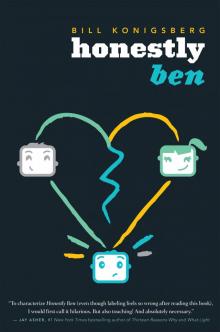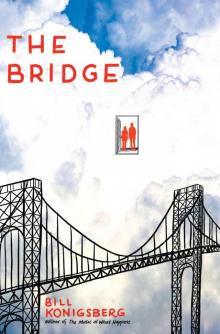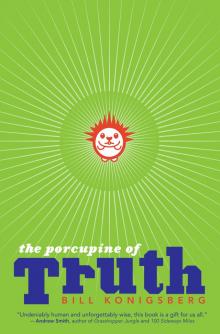- Home
- Bill Konigsberg
The Porcupine of Truth Page 21
The Porcupine of Truth Read online
Page 21
“So mostly he drank himself to sleep, and as the drinking got worse, he got mean. He yelled at his wife. He loved his son, but sometimes he ignored him. And because he was basically good inside, this tore him up further, and he thought about ending it all.
“One day in the mid-seventies, he heard about a choir director’s conference in San Francisco, and he convinced the pastor at his church to let him go. It was the first of several consecutive years in which he flew to San Francisco for a week.
“Those weeks were what he looked forward to through all the cold winters. The second week of April. A chance to be somewhere else. To be someone else. To follow his heart. And during those weeks, I feel strange saying this to you, but he —”
“I get it,” I say.
He nods and smiles. “You get it. Let’s just say he made many friends, friends he’d spend time with once a year.
“Sometime in the late spring of 1982, he was getting dressed and looked down and saw a purple spot on his shoulder. He rubbed it. It looked mostly like a pimple that had popped, but a little different than that. Over the course of the next few weeks, several more formed on his chest and one on his neck. He went to the doctor in Billings. The doctor had no idea what it was. He went for tests. They were worried he had skin cancer. The news came back good, in a way. It was a rare form of benign cancer called Kaposi’s sarcoma. The only thing strange about it was that he wasn’t a sixty-year-old Mediterranean man. That’s who usually got the condition, and they’d put up with the unsightly lesions and die of something else, years later.
“Russ went to the library to do some research. He couldn’t find anything, until one day, a search turned up an article about Kaposi’s sarcoma cases in gay men. His heart flipped in his chest. He cried, because he knew that was him. He knew these things were related.
“Information was scarce, but he learned what he could about what was at the time called gay-related immune deficiency. He learned that it was fatal. He learned that it might be possible to pass it to sex partners, and even though he and Phyllis were no longer physical, he thought about how he’d kissed her on the cheek a few times, and he sobbed in the library. He stole the medical journal he was reading, and he played hooky from work for a week, wondering what he was supposed to do. No doctors in Montana would know anything about what was then called GRID.”
“GRID!” I yell. “That was in the letter. ‘The world’s most dangerous and expensive grid’! What’s KSREF?”
“Oh!” Turk blurts, like he’s been goosed. “Blast from the past! The … Kaposi’s Sarcoma Research and Education … Foundation, I suppose?”
“Wow,” I say. “So not a Kansas referee?”
He smiles. It’s a sad smile, but it makes me feel closer to him.
“So anyway, Montana doctors had no idea what was going on, since it was happening in Los Angeles, San Francisco, and New York. And even if they did, this was Billings, Montana. Russ knew if anyone found out, he’d bring shame to his family.
“Finally he gathered up the courage to tell his boss.”
“Pastor John,” I interrupt him.
“Yes, you mentioned him earlier. A name I had enjoyed not thinking about for a long time. So he told this Pastor John fellow, his best friend, and the man was good to him. To some degree, anyway. Your grandfather didn’t have much money saved up, and he knew he had to get to San Francisco for treatment. The pastor helped him get here. He used church funds to pay for Russ’s trip, and he created something of an underground railroad of religious friends for him to stay with. It was quite a journey.”
“I know my granddad joined AA along the way.”
Turk smiles. “A good thing too. Because when Russ got to San Francisco, he called his friend Graham. Graham, God rest his soul, had one friend who was in AA, and that friend was me. So when Russ arrived in town, guess who got to take him to his first meeting here?”
Turk looks out into the distance. A serene expression passes over his face.
“We fell in love almost right away. He was such a big, goofy guy. I get that when he was an active drunk, he was awful to be around, and there were moments when it was awful here too. Not easy, giving up the booze. But mostly he was sweet and incredibly creative.
“One morning in bed, I asked him for some orange juice. He went to the kitchen and didn’t return, and I started to wonder if he’d heard me. Ten minutes later, he came back and handed me a piece of paper. He’d drawn three rabbis wearing orange coats in Magic Marker. At the bottom, he wrote, ‘Orange Jews.’ ”
I shiver. “Oh my God. I would do that,” I say.
“You poor kid,” he says.
“I know.”
“The thing is, his health got better. Thanks to AA, he certainly got happier. His face got brighter and you could see that he was shining through, because for the first time in his life, he was himself, totally.
“We set up house, and, well, I was sick too. A few times, he had to nurse me through stuff. Pneumonia, mostly. And I had to nurse him through some ugly stuff as well. But we persevered. We went to AA meetings five times a week, and we talked about life and I learned to understand his faith, and by the end, it became a much kinder faith. He was a lovely, lovely man.
“In the late summer of 1984, he came down with a cold. A simple cold. But it stayed. One night, he woke me up gasping for breath, and I just knew. I rushed him to the hospital. It was pneumocystis, which was the pneumonia that killed so many people early on in the epidemic. And like he had a ‘Kick me’ sign on him, as they were treating him for that, the spots activated. The KS. They attacked his mouth and then his lungs and then, well, then. He just …”
Turk wipes a tear out of his right eye.
“It was so fast. He was my life. When he died, my heart died. Somehow I survived long enough to get the cocktail of drugs that’s kept me alive, but that’s a part of me that didn’t make it. I’ve dated since, but never once have I allowed anyone to move in, because they couldn’t possibly take his place. He’s that one-of-a-kind person we all search for. He’d serenade me in the evening, making up nonsense songs that were so, so strange and so, so funny.”
“I just read his song ‘Three Sightless Rodents,’ ” I say.
He looks up at me, and I sing it to Turk.
“Three sightless rodents, three sightless rodents. See how they perambulate, see how they perambulate. They all perambulated after the agriculturist’s spouse. She cut off their lower extremities with a utensil designed for the dissection of meat. Have you ever seen such a spectacle in all your existence, as three sightless rodents, three sightless rodents.”
This makes him laugh, and the laugh soon turns to sobs, and he puts his head in his hands and his thick back heaves up and down. I don’t know what to do, so I put my hand on his neck. It feels interesting. Like I’m touching family, in a way. And I am.
He finally wipes away the wetness from his face and wipes his nose a few times too. I reach into my pocket and pull out one of the unused Kleenexes he handed me back in the church. He takes it and thanks me.
“His biggest regret was that he never made peace with your father,” he says. “Pastor Logan asked him not to tell anyone, even his wife. The help was conditional. The money came from the church, and the pastor was petrified of a scandal. What if his congregants found out that their money was going to someone with gay cancer?”
“Whoa,” I say.
“Yes, well. Anyhow, Russ disobeyed that and did tell Phyllis, and she was so angry and ashamed. She demanded that he not tell your father. And it tore him up that he couldn’t, but he promised her…. They got divorced by mail. Afterward, it plagued Russ, knowing that his son didn’t know where he was. And many times, he woke me up crying. He knew he’d hurt Phyllis, but he couldn’t understand why she’d punish Matthew. He wrote him a letter, telling him the truth. But he just couldn’t mail it, and that was a failing on his part. I still have trouble forgiving him for that, for leaving it untended and for leaving it on me
.”
“What about all the letters we found?”
“The unreadable ones?”
“Yeah.”
“Well, if they hadn’t been unreadable, you’d know that they were all birthday cards. The first two were from Russ. He decided that he’d keep it light and avoid any mention of what was going on, in the hopes that Phyllis would have a change of heart and let Matthew see them. A couple months after he died, I took over the practice and sent your father a birthday card. Mine was not so tame, as I hadn’t made any agreement with Phyllis, and I felt Matthew had the right to know. So in that first card, I explained to him what had happened. I hoped that by leaving off the return address, it might get past your grandmother, and for the first decade or so I included an address inside the notes, in case he wanted to write back. I so wanted to know your father, but he never responded. I was never sure if that was his choice or Phyllis’s. How long ago did she die?”
“Seven years ago.”
“Hmm,” Turk says. “Where did you find the letters?”
“In a box with all of his stuff, at the pastor’s place.”
“So if your grandmother was intercepting my notes before she died, apparently Pastor Logan took it on himself to keep up the practice.”
I think back to something weird my dad told me the first time I saw him back in Billings.
“My dad said the pastor always brought in my dad’s mail. He must have been funneling the letters out for years. Why would he do that?”
Turk looks angry. He shakes his head. “Beats the hell out of me. Did you know I went to Billings? Did you know I met your father and grandmother?”
“You did?”
“I did. Spring of ’85. It was torture, not knowing whether your father had even seen the notes, and at a certain point I figured I’d take a trip and meet Russ’s people. I found the house and rang the doorbell, and your grandmother answered. The moment I saw her face, I realized I couldn’t follow through. I pretended to ask for directions, and we spoke for maybe thirty seconds. When I lingered after, hoping to catch a glimpse of your father, I saw the pastor peek out through his blinds. I nodded at him, and he was very strange, kept looking out his blinds at me. One of them called the police on me, and I remember seeing your father come outside when the police car arrived. I had to tell them I had the wrong address and was sorry to have bothered anyone. Your father, he was maybe twenty by then, handsome beyond belief. I always felt, well — I always felt that in some way he knew who I was. I’m sure that’s crazy. It’s just a feeling I had and never got rid of. The way he looked at me.”
“He didn’t, I’m sure,” I say. “I’m pretty sure this will be news to him.”
“So we’re going to tell him?”
I put my hand on his back in a way that feels normal, now that I understand that he’s my blood. He is me, and I am him, and I am my grandfather. We’re the same. It’s freaky to think that someone who is just like me died of AIDS. That someday, I might get a disease because I’m a human and all humans get diseases and die. It’s part of life, I guess, and that makes me feel surprisingly alive.
“So can I call you Grandpa?” I ask.
The smile starts at his ears and lengthens the minus signs to full dashes, and I see his teeth, so small and a little browned out, and I love them.
“You must,” he says.
MY NEW GRANDPA and I have lunch at a pasta place in his neighborhood, and even though the news he just gave me is sad, I feel a little giddy. Maybe I haven’t found my grandfather, but I have found someone I like, who seems to understand me pretty darn well. I especially like telling Turk funny things, because of his reactions. I explain to him, for instance, how my mother says things like, “I need to own this feeling,” and then add, “I think it would be cool if there was some sort of business out there that bought and sold feelings, leased them, or allowed people to buy aftermarket feelings at reduced rates.” He looks at me with kind eyes and says, “Oh, Russ.”
It could be creepy. But it isn’t creepy. It makes me feel connected to my granddad.
When he goes to the restroom, I look at my phone. I have a bunch of text messages from Aisha. The most recent is all question marks. I know I should answer, but I just want to focus on Turk.
I write: Call you in a bit. All good.
Toward the end of lunch, I see someone with a beer walk by. I look at Turk and say, “Would it surprise you if I told you I’m a little too curious about alcohol?
“No,” he says. “It wouldn’t surprise me. Alcoholism can run in families, you know.”
“How would I know if I’m an alcoholic? If I should be going to meetings?”
“How much do you drink?”
“I had my first beers in Salt Lake City. Three of them. Pissed Aisha off big-time.”
He nods. “I think if you’re worried, you shouldn’t drink. It gets bad, Carson. And it happens fast. Once that train starts rolling, you can’t stop it. I promise.”
In that moment, I make a vow to myself. I may have a million other problems. I may make all sorts of mistakes in my life. But I will not become an alcoholic. I will not cross that line, and I’ll do it by never drinking, ever. It’s the only way I can be sure.
“Thanks. You may have just saved my life.”
“Don’t mention it,” he says, smiling.
He sees the waiter and asks for the check, and when the check comes, he motions for the waiter to bend down so he can whisper in the guy’s ear. The waiter looks confused, and then he smiles. And I’m like, Is he propositioning the waiter?
When the waiter walks away, I say, “What was that all about?”
Turk waves me off. The check comes, and Turk gives the guy his credit card.
We sit in awkward silence. “You’re really not going to tell me what that was?”
“Don’t you worry about it,” he says, giving me a quizzical look.
The guy brings back two credit card slips. Um, what’s happening here? Is he paying the guy? Is this like a prostitution thing? A drug thing? My stomach sinks.
“Now you really have to tell me,” I say.
“Carson,” my new grandfather says. “For God’s sake. Drop it.”
As we leave the restaurant, the waiter gives Turk a hug. Once outside, I stop walking. “No. You one hundred percent have to tell me what’s going on. I am freaking out here.”
He shakes his head at me. “Good God, you’re a drama queen. You really need to know?”
“Yes.”
“You’re very nosy,” he says.
“Just tell me,” I say.
He runs his craggy left hand through what’s left of his hair. “I just attempted to do a random act of kindness, if you must know. I paid the restaurant an extra sum of money, none of your business how much, so that the next few people could eat for free. But since it was supposed to be an anonymous random act of kindness, I suppose the anonymous part is null and void now.”
He walks on and I just stand there, feeling dirt low about what I suspected. “Sorry,” I mumble.
He waits for me to catch up, and we walk on together. “Don’t worry about it,” he says.
“No, really,” I say. “I’m sorry. I trust you. I won’t do that again.”
“You’re a sweet kid,” he says. “Like your grandpa.”
“He was, like, forty, right?”
“That’s a kid,” he says.
By the time we get back to his place, I feel like I’ve known Turk forever. I curl up on the couch, and Gomer sits next to me and rests his muzzle on my feet, which is cool. Maybe I’m beginning to get dogs.
“So what’s the average price of a present you would have given me, say, every birthday and Christmas?” I ask, patting Gomer’s head, which makes him turn around and pant, his mouth open wide, his tongue sticking out.
Turk laughs. “Is this a shakedown? On the very first day of my grandfatherhood?”
I nod. “Yep. Total shakedown.”
“What the hell do I care?�
� he says, throwing his hands in the air. “I got all the funds I’ll ever need, and a severe lack of family. Seems like a good trade. What do you need?”
When I explain to him the first thing I really want, he isn’t so sure he can do it.
“You sure? How about a nice sweater? I would happily improve your wardrobe. Because this,” he says, pointing up and down at my ratty T-shirt and Gareth’s baggy shorts. “This is unbecoming.”
“This is unbecoming because we left for a day trip a week ago and all I’ve had since then is what I was wearing that day, plus what a Wyoming oldster and a Salt Lake City boozer-in-training was willing to give me. And, of course, most of what I have is currently in Aisha’s car.”
He wrinkles his nose. Then he sits down and relents. “Fine. Dial for me.”
“Thanks,” I say. “I owe you on this one. And since this has no monetary value, we’ll start on the birthday and Christmas presents after, okay?”
He grins and mutters, “The kids these days.”
Turk takes the phone from me. He nods slightly when the call is picked up.
“Hi,” he says. “Would this be Aisha Stinson? I’m calling on behalf of a misguided child named Carson Smith. This is Turk Braverman, Carson’s late grandfather’s ex-lover.”
I can’t hear the words, but I can actually hear a happy shriek through the phone, and I realize how much I miss Aisha.
“Well, get on over here. I’ll catch you all up. And yes, you have a place to stay tonight.”
He listens more.
“I’m well aware you’re angry at him. As Carson’s newly minted grandfather and as someone who knows his bloodline a wee bit, I feel it’s my place to tell you he comes by his stubbornness honestly.”
“Hey!” I yell.
He ignores me. “And his selfishness, and his moodiness. Now, young lady, what part of this is on you?”
This I want to hear, but all I can do is watch and listen.
“Fair enough. Come on over and we’ll work things out. You have directions?”

 Honestly Ben
Honestly Ben Openly Straight
Openly Straight The Bridge
The Bridge The Porcupine of Truth
The Porcupine of Truth